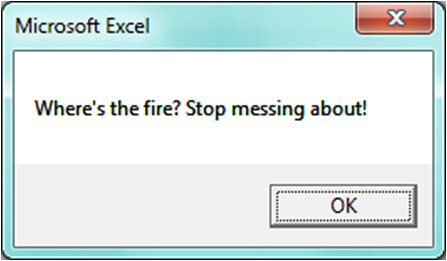 In this series I’m going to be making some suggestions, putting out some ideas. These are based on presentations I’ve given. I can think of how these ideas, or their implications, might be applied in the classroom. However, I think it better if I stand back and let you do that part of the work!
In this series I’m going to be making some suggestions, putting out some ideas. These are based on presentations I’ve given. I can think of how these ideas, or their implications, might be applied in the classroom. However, I think it better if I stand back and let you do that part of the work!
I’m a great believer in what has come to be known as “authentic learning”, that is school work based on real issues. But I still think there’s room for creating things that, ostensibly, have no purpose at all.
A case in point is the pair of alerts I set up in Excel once, using Visual Basic for Applications (VBA). I had created a spreadsheet assignment for the students, and on the spreadsheet I placed the following box:
As you might have predicted, when a student clicked on the box, which of course was irresistible, they received the following alert, accompanied by a recording of my voice telling them to get back to work:
 ... and the inevitable response!
... and the inevitable response!
Pointless, right? Except that it piqued their curiosity:
“How did Sir do that?”
That led to an exploration of IF statements and “pseudocode”, and an exploration of how we might have made it a bit more complex, using IF-THEN-ELSE.
There are a few lessons from this I think:
1. I’m a great believer in the good writer’s adage: show, don’t tell. Don’t say, for example, “He was angry”. Rather, say “He scrunched up the paper till his knuckles were white”. Similarly, set something up for the students to marvel at and explore. If I’d have said “today we’re going to look at IF statements”, I’d have probably been met with a collective groan. Get them interested first, and your work is made so much easier. Obvious, but worth stating nonetheless.
2. We covered IF-THEN and IF-THEN-ELSE statements, and we did so on a need-to-know basis. I didn’t try to teach them anything which might be considered to be prerequisites for learning those concepts. I think people can learn bundles of concepts in a non-linear way, and come back to them at a higher level or in greater depth at a later stage.
3. Just because something is apparently fun and pointless, doesn’t mean it isn’t actually serious and purposeful!
Your newsletter editor is hard at work sifting through the submissions for Digital Education, the free newsletter for education professionals. Have you subscribed yet?
Read more about it, and subscribe, on the Newsletter page of the ICT in Education website.
We use a double opt-in system, and you won’t get spammed.


